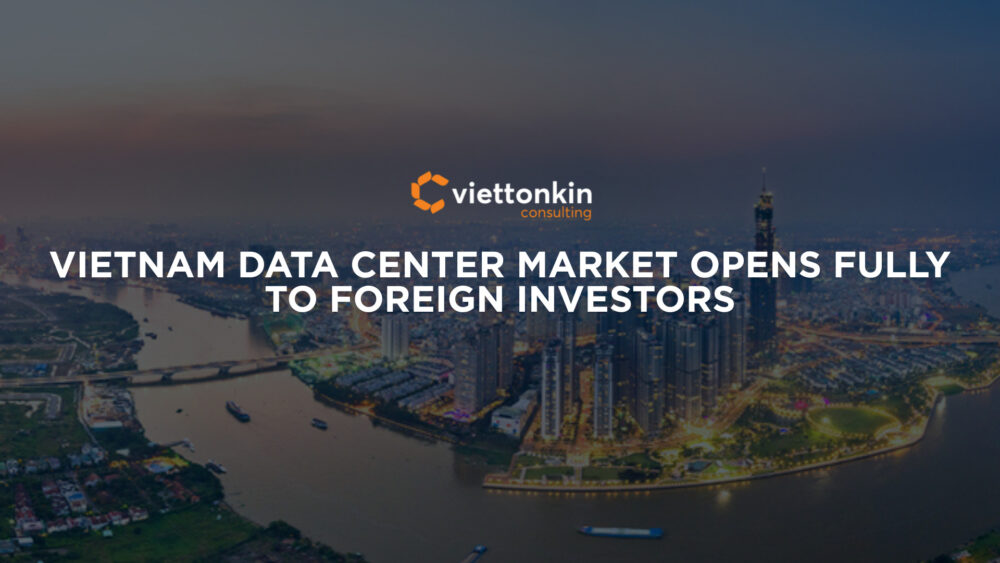Vietnam's data center market is undergoing a historic transformation. It is rapidly emerging as one of Southeast Asia's most attractive destinations for investment in digital infrastructure. The nation's Law on Telecommunications (Law No. 24/2023/QH15) allows 100% foreign investment in data center services; however, market access restrictions will apply if the data center service provider provides […]
Vietnam's data center market is undergoing a historic transformation. It is rapidly emerging as one of Southeast Asia's most attractive destinations for investment in digital infrastructure.
The nation's Law on Telecommunications (Law No. 24/2023/QH15) allows 100% foreign investment in data center services; however, market access restrictions will apply if the data center service provider provides network connectivity services. This is a significant change from the previous 49% cap on foreign ownership.
This landmark reform is a strategic move to attract investment while balancing the country's data management policies, positioning Vietnam to compete with regional hubs and support its booming technology sector.
Key Takeaways:
- Full Foreign Ownership: The new law removes the 49% cap on foreign ownership, opening the market to global investors and large-scale hyperscale projects.
- Surging Demand: The country is seeing growing demand for data storage, driven by data localization laws, the increasing adoption of AI, and a booming e-commerce market.
- Streamlined Entry: Simplified administrative procedures are expected to cut approval times for a new data center from 18+ months to 6-9 months, a critical factor for new entrants.
- Competitive Costs: Vietnam offers significant cost advantages, including lower construction costs compared to primary markets like Singapore, helping investors remain competitive.
- Renewable Energy Focus: The government's support for renewable energy through Direct Power Purchase Agreements (DPPA) is crucial for the sustainable growth of Vietnam's data center capacity.
Full Foreign Ownership Transforms The Market
The most significant barrier to foreign investment in Vietnam’s digital infrastructure has now been dismantled. This change in foreign ownership policy is a game-changer.
According to the UNCTAD Investment Policy Monitor, the Law on Telecommunications, approved in November 2023, is expected to stimulate significant market growth. This move allows the country to better compete against its regional peers.
This policy shift creates a more attractive market for investment:
- Vietnam: Now fully open, encouraging direct investment and control over data assets.
- Regional Peers: Some maintain partial restrictions, making Vietnam a more appealing market for certain investment models.
This change is projected to attract a new wave of investment from tech giants and specialized data centre operators across the Asia Pacific region.
Data Localization And AI Fuel Unmet Demand

While market liberalization provides the entry ticket, it is the explosive growth in Vietnam's data that fuels the demand.
The Law on Cybersecurity 2018, which requires many companies to pursue local data storage, has created a surge in demand that local operators cannot meet.
While some international firms initially raised concerns about increased operational costs and data privacy, the Law on Telecommunications together with newly issued regulations such as the Law on Personal Data Protection effective from January 1, 2026 serve as the Vietnamese government's strategic response, making it easier and more attractive to invest in the necessary digital infrastructure to comply.
A report from Vietnam Briefing (2023) highlights that this gap between regulatory-driven demand and current supply presents a golden opportunity. The massive amount of data generated by AI and e-commerce requires robust, large-scale data centres that foreign investors are well-positioned to build.
Streamlined Market Entry And Legal Responsibilities

The Vietnamese government has also simplified market entry. Outdated administrative procedures have been updated to support technology investment.
An analysis from Baker McKenzie (2023) notes that data center services are a distinct business line, exempting them from some licensing hurdles. While this eases market entry, cloud providers must understand their legal responsibilities. Cloud platforms are not held liable for the content their customers store, but they must comply with government requests to block or remove illegal content.
This creates a more transparent pathway for investment in Vietnam:
- Old Process: Unpredictable, often taking over 18 months.
- New Process: The timeline is expected to be 6-9 months, aligning Vietnam with other hubs in Southeast Asia.
Challenges, Costs, And The Competitive Landscape Of Vietnam Data Center

Despite positive changes, investors face challenges. The initial cost for equipment and construction remains high, requiring a 5-8 year payback horizon.
Investors must also navigate a complex regulatory environment characterized by decentralized provincial approval processes and a lack of master planning for digital infrastructure.
While offshore data center service providers offering cross-border services to users in Vietnam are required to notify the Ministry of Science and Technology (MST) (formerly the Ministry of Information and Communications), onshore data center service providers that have been established in Vietnam must register with the provincial people’s committee where the enterprise is headquartered. Furthermore, securing a reliable green power source remains a key hurdle.
The local market is currently led by players like FPT Telecom and CMC Telecom, a prominent telecommunications group, who hold significant market share. To remain competitive, new data centres from players like Amazon Web Services (AWS) must offer high-capacity, energy-efficient solutions that support the latest AI technology.
Market Outlook: Growth And Sustainable Solutions
The outlook for Vietnam's data center market is exceptionally strong. The convergence of open investment policy, massive data demand, and government support creates a powerful trend for growth.
- Projected Growth: The market is projected to see a high annual growth rate. According to Vietnam Briefing (2023), a report from Research and Markets forecasts the market will reach USD 1.03 billion by 2028.
- Sustainable Solutions: The introduction of Direct Power Purchase Agreements (DPPA) is a critical step, allowing private companies to buy renewable energy directly and address green power issues.
- Investment Plans: Major cloud providers and tech giants have announced plans to expand their capacity in Vietnam, signaling strong confidence in the market’s growth trajectory.
This combination of factors ensures Vietnam will be a key player in the digital infrastructure of Southeast Asia.
Frequently Asked Questions
What is the biggest change for foreign investors in Vietnam's data center market?
The move to 100% foreign ownership is the most critical change. It allows global operators and cloud providers complete control over their investment, technology, and operations within the country, a factor that is expected to unlock a new wave of large-scale investment.
How does Vietnam compare to Singapore on cost?
Vietnam offers significant cost advantages. Factors like lower construction costs and competitive operational expenses make it an attractive alternative. While Singapore is an established hub, Vietnam provides a compelling economic case for new hyperscale projects and those looking to diversify their presence in Southeast Asia.
What is driving the demand for so much new data capacity in Vietnam?
The demand is driven by several factors: government data localization laws, the rapid growth of the digital economy, the increasing adoption of data-intensive AI applications by local businesses, and the expansion of both local and international cloud platforms requiring in-country data centres.











